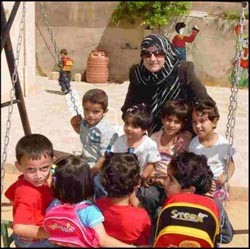
Zeinab Momani’s high school scores did not allow her to fulfill her life’s desire of attending university - but she did not stop seeking other options. 25-year-old Zeinab heard from her brother about a short business-management training program that teaches participants how to start their own business.
This opportunity was a beacon of hope for Zeinab. Poverty and unemployment rates were rising fast in the impoverished areas of Jordan. Entrepreneurship became a practical solution to boost employment and increase income. Zeinab quickly enrolled in USAID’s “Simplified Start and Improve Your Business” training program. By the end of the program, she realized that she could start her own business and began to rethink her future.
“When I completed the training, I felt like a new woman. I was about to start my own business and enter the world of entrepreneurship,” says Zeinab.
Entrepreneurs in Jordan often lack skills to assess market needs and basic principles of sound business management. They need to improve their business performance in order to establish viable enterprises and realize their full growth potential.
To meet this challenge, USAID developed a short-term business training initiative to help very small businesses in underprivileged communities start or improve their businesses. In the one year since the training began, the program has covered almost all areas of Jordan and provided post-training follow-up services of individual counseling, business mentoring, and business evaluation.
Zeinab conducted a feasibility study and a market needs assessment after completing her training. She then obtained a loan of $4,000 to open a nursery and kindergarten in her small village of Sakhra, near Ajloun in Northern Jordan.
110 students are now enrolled in Zeinab’s program and she employs nine women from her village. In addition to her business, Zeinab established a cooperative for the women from her village to utilize their many skills to improve their standards of living. The association will undertake many small projects such as a mill, a diary products production lab, and recycling of wool waste.
Zeinab has new hope and believes that by undertaking this challenge, she “was contributing to changing the stereotypical image of women and proving to those around me that the Jordanian woman is capable of participating in the social and economic development if she has the opportunity.”







Comment
Make a general inquiry or suggest an improvement.